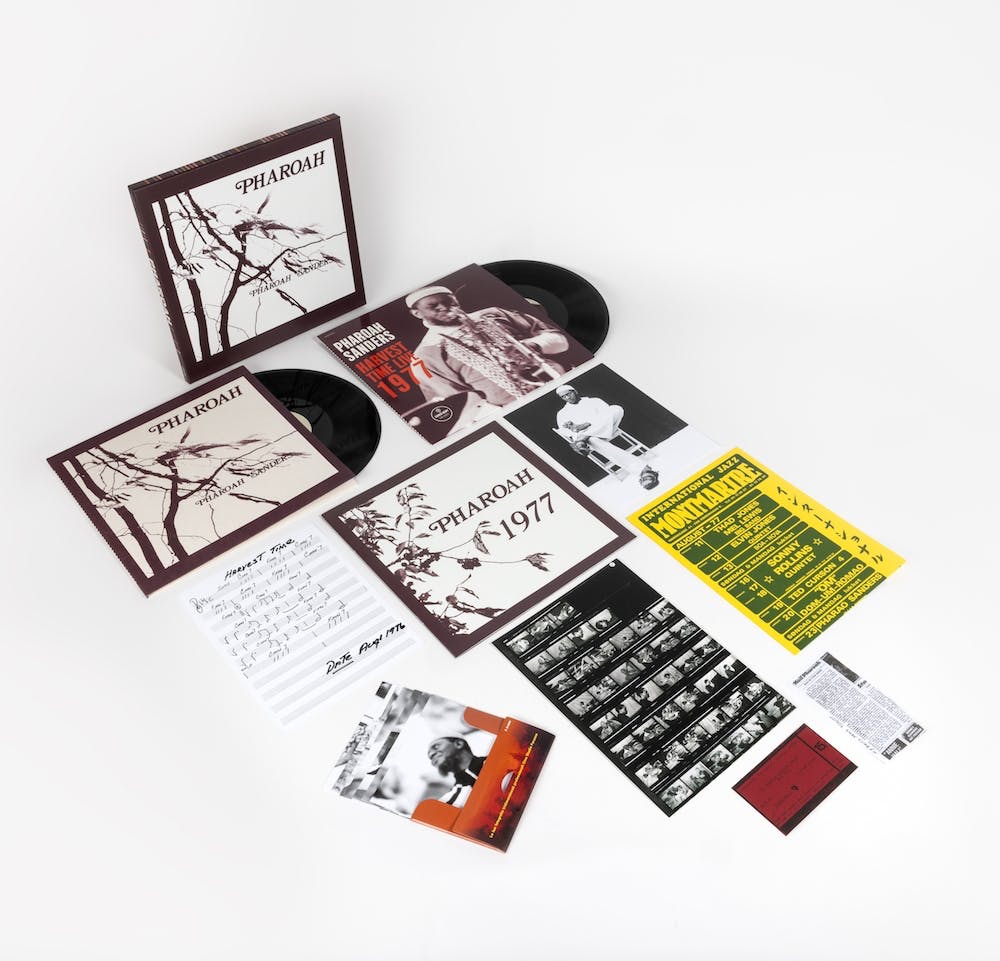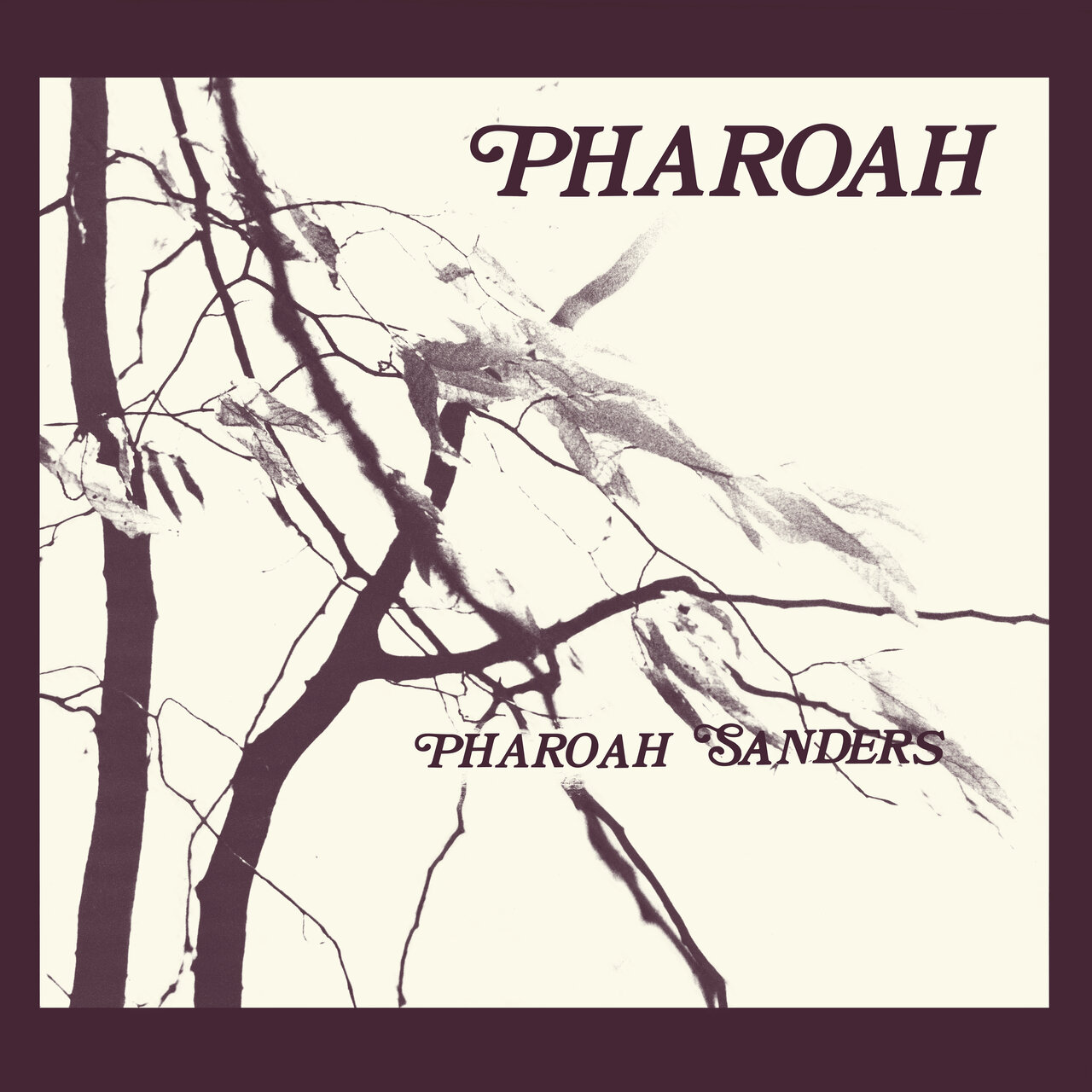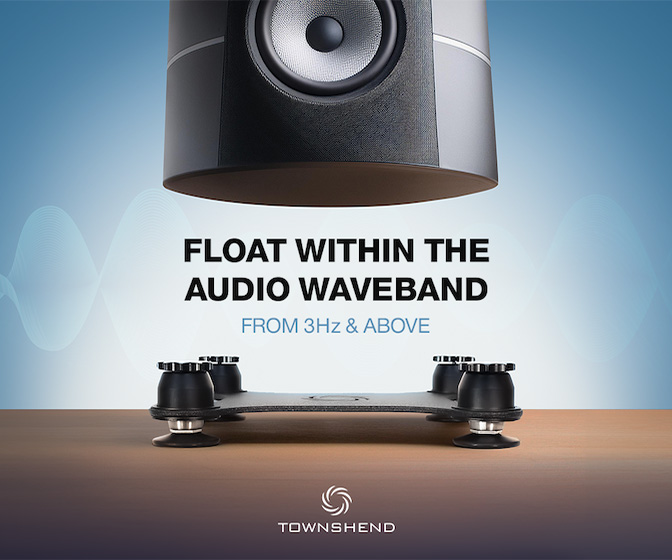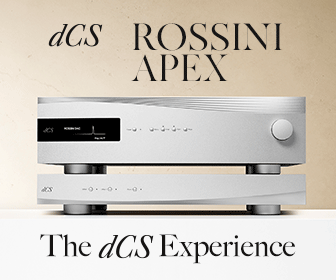Luaka Bop Reissues Pharoah Sanders’ 1977 Rarity ‘Pharoah’
A reasonably priced deluxe box set spotlights the legend’s post-Impulse! classic
Pharoah Sanders’ 1977 album Pharoah is one of beauty and contentment, of family and love. You could even call it relaxed, a term unfit for his other 60s and 70s classics. The story behind it, however, is one of bitterness and disappointment—a complete contrast to the record’s majestic sound.
The saxophonist, who’d not entered the studio for at least three years, found himself and his band in a large, concrete room with minimal adornment and a rather primitive recording setup. This room, a former spring water factory in Rockland County, New York, was home to Bob Cummins, the corporate lawyer and spiritual jazz obsessive behind the small label India Navigation. Limited on resources and skill, Cummins wanted his hero Pharoah Sanders to record a saxophone and bass duo session. Sanders needed something more complex, but not in the way that Cummins expected.
Pharoah was the musician’s sole album for India Navigation, a highly sought-after rarity now reissued by Luaka Bop. It bears a few of the hallmarks of his iconic Impulse! releases (many of which desperately need to be reissued), yet focuses on domestic love and family rather than on spiritual enlightenment. That tense first session with Bob Cummins became side two of Pharoah: “Love Will Find A Way” and “Memories Of Edith Johnson.” “In America as a musician you don’t know what to do anymore, so much money is made with rock,” Sanders observed. So he assembled a group of players capable of interpreting the jazz language in a rock form: his then-wife Bedria Sanders on harmonium, guitarist Tisziji Muñoz, bassist Steve Neil, organist Clifton “Jiggs” Chase (who later worked for Sugar Hill Records and sequenced the rhythm on Grandmaster Flash and The Furious Five’s “The Message”), drummer Greg Bandy, and longtime percussionist Lawrence Killian.
“Love Will Find A Way” is an upbeat jam with Pharoah singing improvised lyrics to Bedria: “Come on, have faith/That love will find a way/Sometimes I feel so good/Giving love to you.” It doesn’t matter that his singing is off-key; you can tell that he’s having fun. He then bursts into a wonderfully screeching tenor solo then a more measured, lyrical tone over a steady groove led by Muñoz whose succeeding solo is equally perfect. Bedria’s warm harmonium and the subtle playing from Chase and Neil provide a sort of “cooling off” moment before Killian’s percussion takes center stage at the end. “Memories Of Edith Johnson” is named for Pharoah’s aunt, an untrained singer but regular churchgoer who “was really a great singer, over everybody […] If there was a hundred singers, you would hear her over everybody. In tune. Not struggling or anything. She never practiced or anything, she was just a natural.” Centered around church organ and wordless vocals, “Memories Of Edith Johnson” is a beautiful gospel tune with hypnotic repetition. Pharoah’s sax appears only occasionally, popping in and out at the perfect times.
Despite Bob Cummins’ building frustration, Pharoah Sanders returned for a second session where he recorded side one, “Harvest Time.” Purists might appreciate it more than side two, though it’s not exactly spiritual jazz either. Based on a two-chord vamp by Muñoz, the serene “Harvest Time” is almost ambient music. There’s no drum set, just Muñoz’ wah guitar and Steve Neil’s bass anchoring it. Bedria Sanders’ harmonium flows like waves in the song’s second half, while Lawrence Killian’s chimes create necessary dynamic shifts.
Little is known about the post-production process, but Pharoah was notably dissatisfied with the recording quality and, in a letter sometime after the first session, Cummins showed his exasperation as well:
“I have tried over the past months to agree to all of your requests to the best of my ability. As you know, the record started out as a saxophone and bass duo because we thought this was something we could handle and afford, and this was the understanding with you. It was your wish that the music be more complex, and I have gone along with this and the resulting increase in effort and expense.
“A suggestion would be for you to come to our place and we can try to get the sound the way you want it—the voices, drums, etc. can be made louder and softer wherever required […] You know, you have never tried this, and neither Lawrence nor I nor anyone else will be able to understand or satisfy all of your requirements unless you are there—it has caused us all a lot of wasted time and effort and money, not to mention the emotional stress, to guess what you want without your being present. And it should be a fine record.”
Pharoah isn’t Sanders’ best record, but it’s reasonably widely loved for a meditative quality that contrasts with his more ferocious better-known work. It’s not fusion nor jazz-rock, and it’s not soul jazz either. It evades classification and that’s perfectly fine. Luaka Bop’s new 2LP or 2CD box set—the first official LP reissue and the only official CD release since 1996—also includes two “Harvest Time” recordings from Sanders’ 1977 European tour. Here, he plays in a quartet with drummer Clifford Jarvis, bassist Hayes Burnett, and pianist Khalid Moss. An 18-minute recording from Middelheim, Antwerp, Belgium is more mysteriously languid than the studio take, and the 10-minute performance from Willisau, Switzerland sounds like something Coltrane’s quartet might’ve done leading up to A Love Supreme. Anyone who likes the Pharoah album needs these takes as well, though I wonder what other recordings might exist from these shows.
Luaka Bop’s Pharoah vinyl box is a true labor of love. It features the Pharoah and Harvest Time Live 1977 LPs, a 24-page book loaded with liner notes and photos, a replica lead sheet/chord chart for “Harvest Time,” a poster from the Jazzhus Montmartre in Copenhagen, a ticket stub for a Frankfurt show, a New York Daily News clipping, a press photograph, an envelope of Pharoah and Bedria’s personal photographs from Italy in 1979, and a contact sheet from the Middelheim show, all housed in an embossed lift-off box. The Pharoah LP comes in a matte direct-to-board gatefold jacket, while Harvest Time Live 1977 comes in a glossy foldover whose design nods to the 60s Impulse! aesthetic. Most labels would charge at least $70 for this package; Luaka Bop’s retail price is $55.

Chris Bellman mastered and cut lacquers for both discs in the box. Pharoah’s tapes are missing, so Colin Young digitized, restored, and made a composite of two original India Navigation pressings. The original recording is distant and often lacking in air and presence, but with a good sense of the room. There are no obvious signs that it’s a needle drop, and this is clearly a much better value than finding a clean original pressing for $600 or more. The live LP, though also imperfect, sounds much more “professional.” Both standard weight LPs pressed at Pallas are very quiet.
The truly spectacular booklet traces the album’s history through interviews with Bob Cummins’ daughter Beth, Bedria Sanders, Tisziji Muñoz, Clifton “Jiggs” Chase, and most importantly, Pharoah himself, interviewed a few days before he unexpectedly passed in September 2022. He didn’t have too much to say about the record, but it’s still amazing that he talked about it and finally agreed to this reissue, which is one of the most comprehensive and thoughtful packages to come out this year.














































